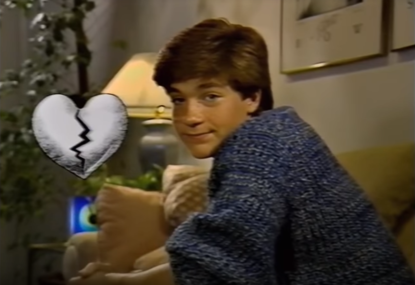Tune in Tonight: "How Can I Tell if I'm Really in Love?"
Being a teenager is one of the most challenging times of your life, fraught with hard choices, such as “what do I want to do with my life?”, “where will I go to college?”, “which New Kids on the Block will I marry?” Complicating things further is that stirring of first love, and the decision as to whether or not you should flip that thing and hit it from the back.
Fret not, teenz, home video will help you. 1986’s How Can I Tell if I’m Really in Love, with an oft-repeated theme song that sounds like it should be used in a perfume commercial, was released with the intention of starting conversations between parents and teenagers about what it means to be in love, and what a healthy romantic relationship should feel like, but probably resulted in a lot of blank stares and uncomfortable foot shifting. It’s hosted by siblings Justine and Jason Bateman, which seems kind of weird, but not nearly as weird as the fact that it also features Ted Danson. In an appearance that screams “community service,” Danson’s primary contribution to the show is wearing an excellent dad sweater and uttering Tommy Wiseau-esque non-sequiturs like “Ha ha ha, okay,” and “If you say so!”
Also appearing are several dozen real life high school students, some of whom say such baffling things as “You don’t have be in love to feel alive, but to feel alive, you have to be in love,” and “Love is making him happy and helping him improve his grades!” Well, I suppose that’s true. Other kids are asked for one word to describe what love means to them, and the answers are the standard “caring,” “honesty,” “trust,” and “happiness.” Jonathan, however, answers “fun sex!”
Stop right there, young man. First, that’s two words. Clearly, you don’t know how to follow directions. Second, though the program is called How Can I Tell if I’m Really in Love, it should actually be called Should I Have Sex, and the answer is a resounding “no.” Justine Bateman, wearing enough plaid fabric to cover a rec room couch, warns the young female viewers that much of their time will be spent fighting off boys who will say and do just about anything to get into their pants. This is backed up by Ted Danson, who literally produces a “little black book” of lines boys use to get what they want. Some of them are the typical “I’ll respect you tomorrow” nonsense, and some have never been said by anyone ever, such as “Making love is a natural development in our growing and developing relationship.”
Considering that in 1986 Ted Danson was best known for playing unrepentant cocksman Sam Malone on Cheers, having him appear in a PSA about the dangers of premarital sex is puzzling to say the least. Danson staring directly into the camera and purring “If you love me, you’ll do it,” addressing what’s supposed to be an underage audience is simply horrifying.
Equally horrifying is a story teen interview subject B.J. tells about immediately falling for a boy when they go swimming together, “but I was only 10 and he was 17.” One would expect B.J. to explain how she came to the realization that she was far too young to understand what love means, but instead she points to one of her earrings and says “Our stone is pink coral.” This is a record scratch moment if there ever was one, but no one asks B.J. to elaborate on the significant number of questions it raises, nor does anyone rebut her story with “Hey, maybe we should edit that out in post.”
The third most cringiest moment is when psychologist Sol Gordon, who wrote the book on which the special is based, speaks in front of a group of teenagers, elaborating on some of the various points being made. Gordon talks like he’s doing a stand-up routine, even when discussing a young female patient who was a victim of domestic violence. A stark reminder of how far we’ve come in the past thirty years, the audience seems to find this hilarious. Mostly it’s just the usual well-meaning cornpone, with musical numbers, and gentle admonishments about not letting love get in the way of your schoolwork or platonic relationships. A bit of shaky science is exhibited in the show’s insistence that real love is without conflict and selfishness, which seems to be setting up its naïve viewers for even more heartbreak than just dating some random jerk who breaks up with you after a week because you won’t put out. “Fall in love with a friend,” Justine suggests at one point, which, as virtually all adults know after a certain point, is actually pretty terrible advice, particularly if that friend is unavailable or doesn’t return your feelings in kind.
So, how can you tell if you’re really in love? Well, according to this program, you’re probably not, so don’t worry about it. As with virtually all PSAs directed at teens, that’s not particularly helpful, but hey, thanks for trying. Considering the teen pregnancy rate peaked in 1990, its strong “avoid having sex by any means necessary” message didn’t really seem to have much of an impact. This is, of course, because birth control isn’t brought up until the very end, when a counselor answers genuinely useful questions about sexual health. With that, the running time of the video is fifty minutes long, while copies provided to schools was a leaner thirty-five minutes. You can probably guess what was edited out in that version, and it wasn’t Ted Danson sweet talking invisible jailbait.









